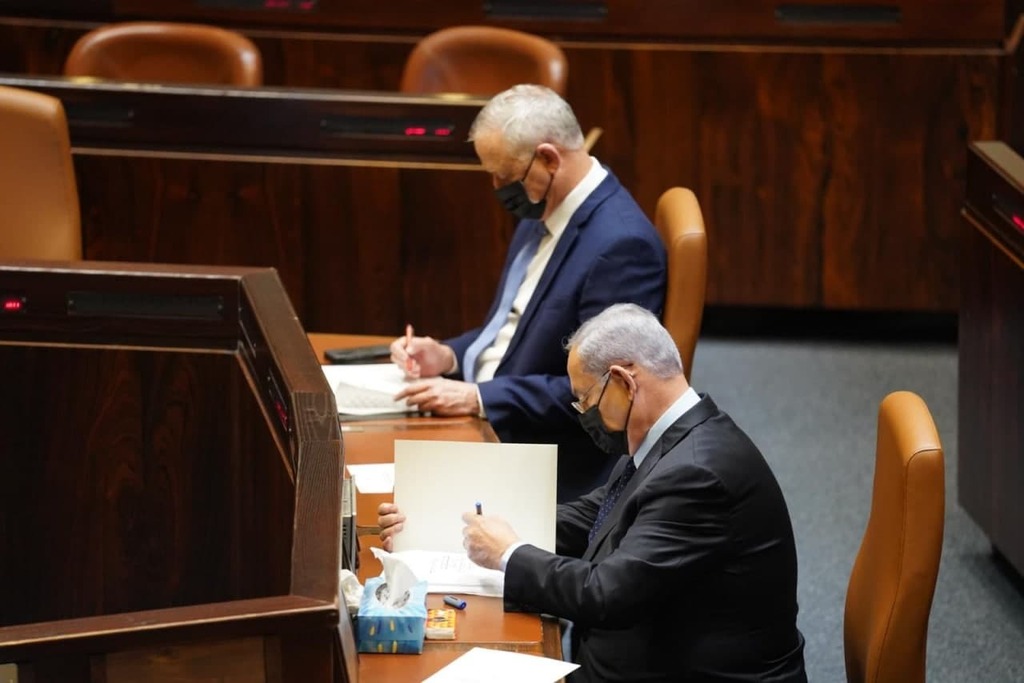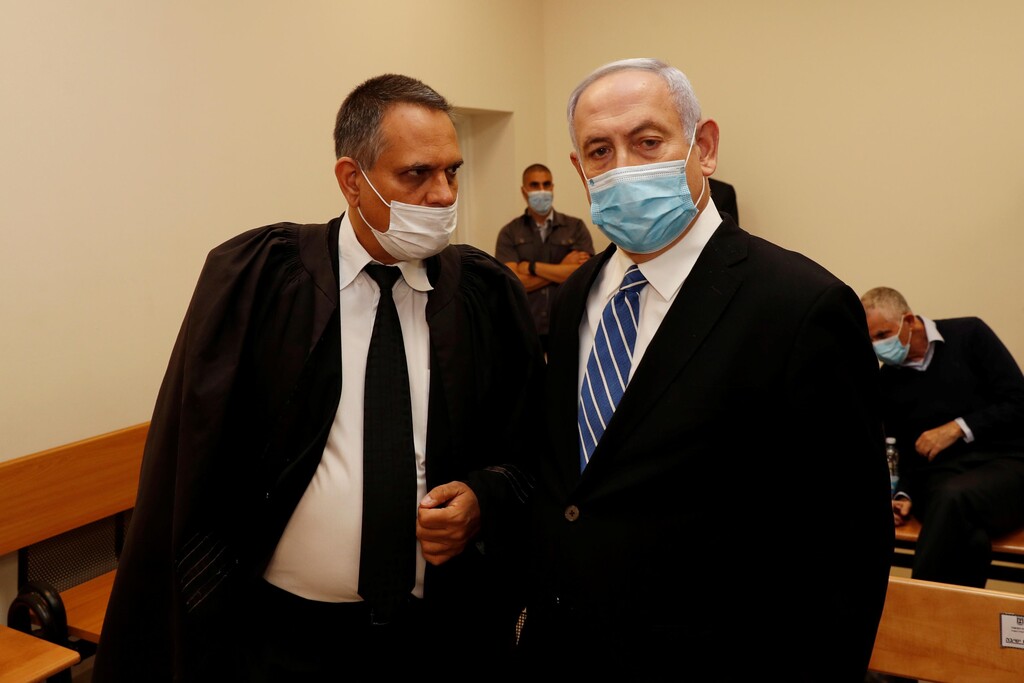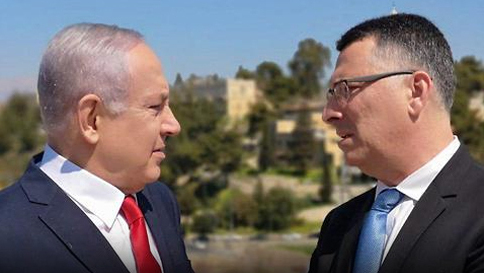Getting your Trinity Audio player ready...
Israel headed into its fourth election campaign in two years at the stroke of midnight Tuesday, as the deadline for passing a state budget expired and the Knesset automatically dissolved by law.
Elections are expected to take place on March 23, 2021 - exactly 90 days after the Knesset dissolved as required by law.
5 View gallery


Defense Minister Benny Gantz, top, and Prime Minister Benjamin Netanyahu in parliament
(Photo: The Knesset)
The inability of warring coalition partners Likud and Blue & White to pass a budget had been expected after a bill to extend the deadline to do so until December 31 was scuppered Monday night by rebel lawmakers from both parties and failed with 47 votes in favor to 49 against.
This left the government with less than 24 hours to reach an agreement on the legislation, get their respective MKs in line behind it and hold the three votes necessary to pass it.
Prime Minister Benjamin Netanyahu of Likud and Defense Minister Benny Gantz, the head of the Blue & White party, blamed one another for the collapse of the coalition.
"This is an erroneous decision on Blue & White's behalf, but if they force these elections on us, I promise you we will win. With your help, the people of Israel, Likud will bring a huge win," Netanyahu said Tuesday night as the clock counted down to midnight, hailing his success in securing millions of COVID-19 vaccines for Israel, recent normalization deals with Arab countries and a strong economy.
"A criminal defendant with three indictments is dragging the country to a fourth round of elections," Blue and White said Tuesday night, referring to Netanyahu's ongoing trial for corruption. "If there weren't a trial, there would be a budget and there wouldn't be elections."
The two formed their coalition last May after battling to a stalemate in three consecutive elections.
They said they were putting aside their personal rivalry to form an "emergency" government focused on guiding the country through the health and economic crises caused by the pandemic.
Legislating a biennial state budget for 2020 and 2021 was part of the coalition agreement signed by Likud and Blue & White, but has been a contentious issue for months.
Power struggle
Under the deal, Gantz assumed the new role of alternate prime minister and was assured he would trade places with Netanyahu next November in a rotation agreement halfway through their term.
Even as that power-sharing pact was being inked, many analysts argued that Netanyahu, on trial for alleged corruption which he denies, would not relinquish his powerful post.
5 View gallery


Prime Minister Benjamin Netanyahu stands in the courtroom as his corruption trial opens at Jerusalem District Court, May 24, 2020
(Photo: Reuters)
Likud had demanded to pass the 2020 and 2021 budgets separately while Blue & White insisted Netanyahu stick to the deal reached after the March 2020 elections.
While the immediate cause of the collapse was the failure to pass a budget, it really reflected the failure of a partnership plagued by mutual hostility and mistrust from the outset.
For seven months, Gantz has suffered a number of humiliations and been kept out of the loop on key decisions, such as a series of U.S.-brokered diplomatic agreements with Arab countries.
Netanyahu accused Blue & White of acting as an "opposition within the government."
At the heart of this dysfunctional relationship is Netanyahu's corruption trial.
Gantz has accused Netanyahu of undermining their power-sharing deal in hopes of remaining in office throughout his trial, which is to kick into high gear in February when witnesses begin to take the stand.
He and other critics believe Netanyahu ultimately hopes to form a new government capable of appointing loyalists who could grant him immunity or dismiss the charges against him.
After Monday's failed vote, the furious coalition chairman, Likud MK Miki Zohar, slammed several party lawmakers for their decision to oppose the bill to extend the budget deadline. Several Blue & White MKs also voted nay, with some lawmakers resorting to subterfuge to avoid their respective party's officials.
5 View gallery


A photo posted on Twitter by Asaf Zamir shows himself, right, Miki Haimovich, center, and Ram Shefa heading to the plenum to vote
(Photo: Asaf Zamir/Twitter)
Israel had this year managed its finances on the basis of a pro-rated version of the 2019 budget, and with just hours to go before the Knesset dissolved, the government approved an emergency addition of NIS 70 billion ($21 billion) to the coffers in order to prevent major cuts to crucial state services.
The fiscal deadlock has plunged Israel into more economic uncertainty at the end of a year when a coronavirus-induced slump is expected to shrink gross domestic product by 4.5% with the jobless rate standing at 12.1%.
Analysts had seen Netanyahu pushing for an election in May or June next year, after the coronavirus crisis was expected to ease and the economy to begin to recover.
Shifting fortunes
A March vote will be riskier for Israel's longest serving leader, who has been facing a wave of street protests against his alleged corruption and his handling of the pandemic.
Though polls point to Netanyahu's party emerging as the largest parliamentary faction after the next elections, surveys also predict a strong showing for his erstwhile Likud rival Gideon Sa'ar, who quit the Knesset earlier this month to establish his own New Hope party and is expected to peel off votes from his former political home.
Several MKs have already announced their intention to join Sa'ar - who unsuccessfully tried to unseat Netanyahu as Likud leader in December 2019 - in the next elections.
Meanwhile, Gantz's political fortunes appear to have plummeted.
Blue & White fractured in April when he decided to strike a deal with Netanyahu and recent polls suggest the party would win only a handful of seats if elections were held soon.
Gantz has always maintained he joined a Netanyahu-led government to spare the country an election while the pandemic was ramping up, not because he trusted the premier.
"Blue and White entered the government, while paying a heavy political price, to serve the best interests of the country," Gantz said on Monday.
"I wasn't afraid to do the right thing several months ago, and I'm not afraid to do the right thing now," declaring his camp would head to a vote with its "head held high."
Reuters, AFP and AP contributed to this report



